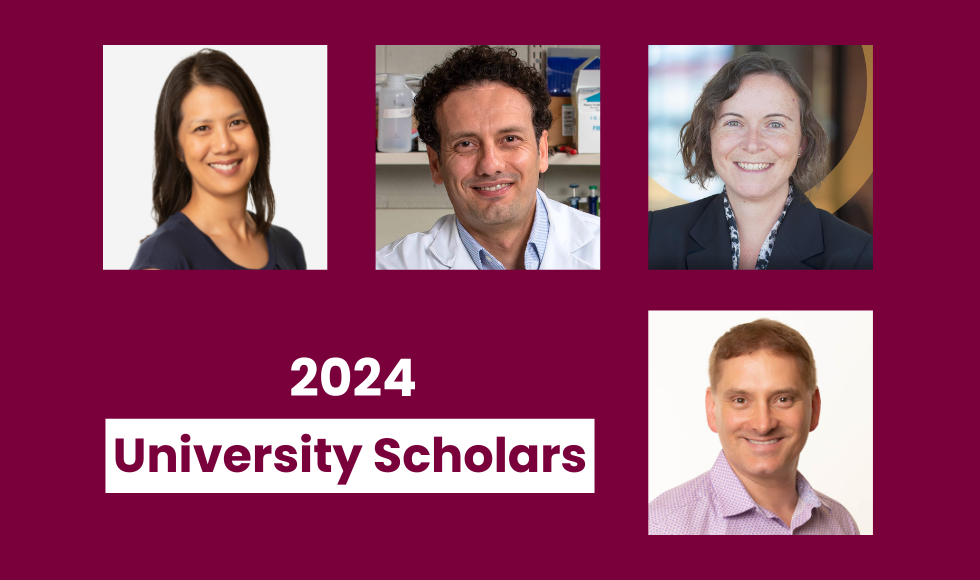Four professors named 2024 University Scholars

Ada Tang, Tohid Didar, Trish Ruebottom and Jason Busse have been recognized for their international achievements, commitment to knowledge, excellence in education, and dedication to serving communities.
July 19, 2024
Four McMaster professors have been named 2024 University Scholars, in recognition of their leadership in their respective research areas and disciplines, and the impact of their work.
University Scholars are mid-career researchers who have distinguished themselves as international scholars and have demonstrated a commitment to the discovery, communication and preservation of knowledge, excellence in education and pedagogy, and to serving local and global communities.
Each University Scholar will receive $15,000 each year of the award (up to $60,000), provided by the provost and the recipient’s dean.
This year’s University Scholars are:
Trish Ruebottom | Associate professor, Human Resources and Management | DeGroote School of Business
 Ruebottom’s rigorous studies of marginalized and highly stigmatized groups, including years or work studying women’s rights organization in Libya, sex workers and the taxi industry, have greatly contributed to the global understanding of the intersection of organizations, inequality, social innovation and change.
Ruebottom’s rigorous studies of marginalized and highly stigmatized groups, including years or work studying women’s rights organization in Libya, sex workers and the taxi industry, have greatly contributed to the global understanding of the intersection of organizations, inequality, social innovation and change.
Ruebottom’s work is published in the top-tier journals and has been recognized with numerous prestigious awards, including the Academy of Management Review Best Paper Award.
As part of her tireless work to advance equity, diversity, and inclusion, Ruebottom takes care to share her research findings with practitioners and her expertise in her classes. She has designed courses on multidisciplinary entrepreneurship, interdisciplinary entrepreneurship, social entrepreneurship and qualitative research methods.
She is collaborating with an international team on a Handbook on Emotions and Values in Institutions. At McMaster, she is part of the interdisciplinary Centre for Research on Community-Oriented Entrepreneurship (CRCE), the Social Innovation Hub and the Research Centre for Overlooked Workers.
Ruebottom’s commitment to equity and inclusion is evident in her service commitments and her generosity with her time, energy and expertise in supporting marginalized groups, . She currently serves on the university’s Board-Senate Hearing Panel for Discrimination, Harassment, and Sexual Violence.
Jason Busse | Professor, Anesthesia | Faculty of Health Sciences
 Busse, the CIHR Canada Research Chair in the prevention and management of chronic pain, has published more than 310 peer-reviewed articles that have been cited more than 18,500 times.
Busse, the CIHR Canada Research Chair in the prevention and management of chronic pain, has published more than 310 peer-reviewed articles that have been cited more than 18,500 times.
He is the principal investigator on the Long COVID Web Research Network grant, funded by CIHR in 2023. Busse led a randomized trial that examined and challenged a commonly used treatment for fracture healing, and led the work to update the Canadian Guideline for opioid therapy and chronic non-cancer pain, now widely adopted in Canada and abroad.
An active educator, Busse is the coordinator for the graduate course in randomized clinical trials methodology at McMaster and has supervised 12 undergraduate students for research projects, 17 Master’s students, 6 PhD students, and 5 postdoctoral students.
In addition to his significant contributions to research and teaching, Busse has shared his expertise with governmental bodies, Parliamentary committees and other policy making offices. His work has an immediate impact.
He chaired Health Canada’s Scientific Advisory Panel on Opioids (2016), which led to new opioid warning labels and patient information material. He is the Director of the National Pain Centre at McMaster University, which holds the copyright for the Canadian Opioid Guideline, and in 2022 he was funded by Health Canada to further update this guidance.
Busse led a focused guideline on cannabis for chronic pain and is completing more comprehensive guidelines with CIHR funding. He was the founding Director of Research for the Chronic Pain Centre of Excellence for Canadian Veterans and developed guidelines to inform management of chronic jaw pain, and interventional procedures for chronic back pain.
Busse engages patient partners in his research efforts and ensures diversity in the guideline panels he chairs. He is working with a team of investigators to develop strategies to formally incorporate equity considerations into guideline development using a 6-component Equity Lens.
Tohid Didar | Associate Professor, Mechanical Engineering | Faculty of Engineering
 Didar, who joined McMaster in 2016, has attracted international recognition for pushing the technological boundaries in the development and characterization of nanomaterials for use in human health and food safety.
Didar, who joined McMaster in 2016, has attracted international recognition for pushing the technological boundaries in the development and characterization of nanomaterials for use in human health and food safety.
Didar has also received several prestigious national and international awards and is a thought leader in research commercialization, introducing the concept of Professor Entrepreneur Op-ed in The Globe and Mail in November 2022, a roadmap for commercialization in academia.
Didar has established and led an interdisciplinary research program on Nano-biomaterials at McMaster University. Since 2017, he has filed 21 patents and published over 62 peer-reviewed journal papers in the top journals in his field, which are already highly cited. His research has been recognized within and beyond academia in mainstream media including BBC World Service, CNN Health, CBC The National, CBC Quirks and Quarks, CTV, Forbes, and the Toronto Star.
Didar has established and led an interdisciplinary research group composed of several professors as well as industry and government representatives along with postdoctoral fellows and graduate students.
A globally recognized a pioneer in in situ food monitoring, Didar has made many contributions to food safety, including the Sentinel Wrap, which signals the presence of pathogenic bacteria; LISzymes, which enable highly sensitive pathogen detection in complex matrices such as milk; and the the Lab-in-a-package smartphone-compatible platform capable of sampling, concentrating, and detecting target pathogens within closed food packages without intervention.
Didar has also designed and developed several transformative nano-coatings that repel pathogens and prevent their transfer. These include RepelWrap, a flexible nanostructured wrap that repels pathogenic bacteria and viruses; a fluorine-free omniphobic coating for medical catheters and pathogen-repellant spray coatings.
Didar also recently collaborated with on bacteriophage-based biomaterials and technology to screen large phage libraries in minutes.
Didar recently received an NSERC Alliance grant with the Women Global Health Initiative (WGHI) to develop wearable sanitary technologies for women, indicating his dedication to solving women’s health issues, especially in developing countries.
Ada Tang | Associate Professor, School of Rehabilitation Science | Faculty of Health Sciences
 Tang, the lead for the MacStroke Canada lab group, is also the Assistant Dean, Rehabilitation Sciences Graduate Program.
Tang, the lead for the MacStroke Canada lab group, is also the Assistant Dean, Rehabilitation Sciences Graduate Program.
Tang has built the foundations for the Cardiovascular Health, exercise, And Physical activity after Stroke (CHAmPS) research program and is a leader in stroke recovery research and related clinical trials.
These include pivotal work on the feasibility and effectiveness of an early exercise intervention for stroke rehabilitation; as well as on a cardiac rehabilitation model of care for people with stroke; a randomized controlled trial examined the physiological effects of community-based stroke exercise on risk factors and cardiovascular function; and a randomized trial of a community-partnered program to promote health and wellness after stroke.
Tang is leading several studies that collectively provide evidence to support the implementation of exercise across the stroke continuum, directly influencing stroke rehabilitation with exercise now included as a major component of clinical programs.
Her commitment to sharing her expertise with the community is evident in her her participation in podcasts, expert commentaries and community and school outreach. Most recently, she has been involved in the newly published Stroke Recovery in Motion Planner, a freely available, evidence-informed resource to guide teams in planning, implementing and delivering community-based exercise programs for people with stroke.
Tang is a role model for students and trainees, with a deep commitment to fostering the next generation of physiotherapy practitioners and rehabilitation researchers.
She has contributed to the education of hundreds of physiotherapy students, and has acted as a final year research project supervisor. She has also supervised six thesis-based Master of Rehabilitation Science students, and 5 PhD students and is an interdisciplinary mentor for a MIRA Postdoctoral Fellow in Aging Research.
Tang is a mentor for the McMaster Women in Science and Engineering Initiative, and topic editor for the Women in Science series in Frontiers. Some of her research examines the interaction between sex and gender and exercise in individuals with stroke. With MacStroke Canada Lab members, Tang has developed a set of core values consisting of collaboration, leadership, resilience, diversity, health and wellbeing, personal growth, and respect to guide research activities and practices.


